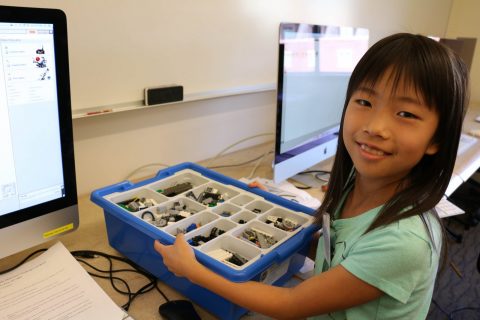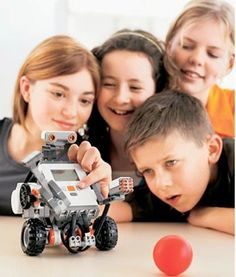What You’re Student will learn … The Syllabus Compressed:
Our StatBotics Practical Engineering through Robotics curriculum is made up of 8 modules spread over 2 courses.
Each 4 module course is taught over 8, 2 hour classes.
Level I – EV3 systems/programming and simple statistics
- Introduction to the brick
- Introduction to PC software (LabVIEW)
- Coding structures
- Motors and Sensors
NOTE: If your student has taken a Lego Mindstorms/EV3 class before, there will be many EV3 concepts in the curriculum that they are already familiar with, particularly in the Level I class. However, our program focuses on data analysis and statistics making it quite different from other courses. Remember, our aim is to teach these concepts using robotics. Robotics is the tool not the subject. We use Robotics to give practical uses of the mathematics that your children are already familiar with, helping to reinforce previous learning, and put it into context in the real world.
When reviewing the curriculum, note the items in each module that your child may not be familiar with, such as the normal distribution, central limit theorem, hypothesis testing, and chi-squared analysis. Even if they have previously taken an EV3 class, they will benefit greatly from the practical application of mathematics that we emphasize in this course.
Level II – Robotics dynamics and control
- Sensor Characterization
- Change and rate of change
- Feedback and Control
- Tracking
NOTE: This module also includes a group presentation or an exam, student’s choice
Level II is unlike any other EV3 class that we are aware of, covering sensor characterization, error evaluation, calculus, and simple control theory. While this may sound beyond your child’s abilities, it is not. The data logging abilities of the EV3 system, combined with the data analytics available in Microsoft Office, Open Office, or Google Docs, allow the students to experience the concepts behind these mathematically complex subjects without getting bogged down in the mathematics itself. Already having an understanding of the concepts will help them enormously when their mathematical skills have matured sufficiently for them to tackle the pure mathematics.
Programing, Robotics and Life Lessons…
The focus of the StatBotics Practical Engineering through Robotics curriculum teaches practical applications of mathematics and statistics. The focus is not on programming or robotics, but these are necessary tools for teaching the mathematical concepts, and so are taught along the way. As with the mathematics your student will learn, we put Great Emphasis on good coding practices even within the simple programming exercises.
To be honest we are engineers first and foremost. That means that everything we do, teach and convey is based in best practices, informational integrity and human curiosity. Code readability and maintainability is at least as important as code functionality. Commenting and suitable variable naming are crucial. Breaking the task down in to easily understandable sections is highly desirable…. you see what we mean.
As to Robotics, because of the focus on data analytics we go considerably deeper into the dynamics of the robotics systems than other EV3 classes. They tend to teach how to do things. We get into the concepts of why things work the way that they do (this is where statistics and geometry/trigonometry becomes crucial), and how the details of the mathematics manifest in the robots behavior. Yes, engineers!
Life Lessons
In addition to the academic learning that comes from the course itself, we have structured the class ground rules to facilitate the learning of important life lessons.
- Mutual Respect – As an engineer, you need to be able to work effectively and respectfully with those who’s opinion and skills might not match your own. That’s why working in an environment of mutual respect is crucial. In our classes, all class rules apply equally to everyone in the room, students, teachers, or any parents present alike.
- Honesty is the Easy Option – Being able to admit when you’ve made a mistake and yes, failed, is a key part of the scientific process. This is how we learn. Many middleschool students by nature of the school system and, well, hormones are focused on getting the right answer. And so, don’t always tell the truth when faced with failure. But, in math, numbers don’t lie… we point this out with respect and emphasize that honestly is the doorway to learning while highlighting how not being honest gets in your way of discovering success.
- Impulse Control – We all have impulses and being around new and exciting equipment, technology and people can often trigger them. The ability to recognize their impulses, allow those that serve their goals, and control those that are getting in their way will help them to better achieve their goals in life.
- Taking Responsibility – A big part of growing up is realizing that we are responsible for what occurs in our lives, not just the victim of the circumstances around us. Even when it appears that we have no control of the circumstances, we still have control over how we respond to them and how we feel about the outcome.
Class prerequisites and equipment
There are no prerequisites for the class, other than students should be currently enrolled in middle school, grades 6-8. We have many requests for students younger than 6th grade to enrole. We find that younger kids are just interested in playing with Lego and not the maths and other concepts that we are trying to teach. If you feel that your child is mature enough to be interested in the maths and not be distracted by the Lego, we can make exceptions to the 6th grade minimum age.
All hardware and software needed for the class will be provided, 1 robot and laptop per 2 students. This equipment will not need to travel home with the students. Hard copies of all class notes are also provided to each student in case they want to study at home, though home study is not required.
Cost and Signup
- Level I $250 per student for 16 hours
- Level II $295 per student for 16 hours
- Summer camp (Levels I & II plus robotics construction) $990 per student for 80 hours
Deposit of $100 to reserve your place is required. The balance is due one week before the first class. Payment can be made by cash, check or credit card through PayPal.
Join Our Mailing List to get Updates on our Fall 2017 Class
Register for Engineering – Robotics & Math Camp
Final Considerations….
Be warned, you may be sufficiently impressed with your child’s enjoyment and learning from the class that you decide to purchase a Mindstorm set for them to use and practice with at home.
The basic home use set costs $350. The Education set, which I recommend, costs $380. There are extra components and add on sets that we use in class which you may want to invest in as well. I can provide details of all the Mindstorm offerings, which are suitable for your needs and how to order online. NOTE: Purchase of hardware for home use is not necessary for the class. There is no homework given out in these classes. However, when you see how well the Mindstorm system works as a learning tool you may want to purchase a set for your child (or for you) to learn and play with. You have been warned.
As you can probably tell from reading this, I am extremely passionate about this class. Please feel free to contact me if you have questions or concerns, or you share my enthusiasm. I am all about feedback. Your feedback is a gift. It will all be very gratefully received.
Looking forward to seeing you in class.
roly


